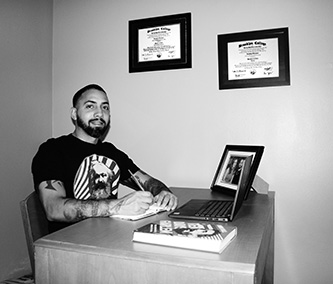Jonathan Velazquez '20

Jonathan Velazquez '20
Patient Coordinator for Physical and Occupational Therapy Clinic
In what ways do you feel your major in history helped to prepare you for your current career? Are there any skills that you developed as an undergraduate history major that are essential to your work? And can you give us an example (or examples) of this?
Being a history major has equipped me for any career field. As an undergraduate I was employed in numerous sectors where I excelled because I was able to apply tactics learned in the classroom at work which has led me to excelling in each position I have held. The mindset of thinking like a historian is truly remarkable. I view things as objectively as I can but understand as humans, we all have our subjective biases that can make it hard for us to see situations from the perspectives of others. For example, majoring in history has improved the way I empathize with others. Everything is not black and white—there is a bureaucratic hierarchy in every field and understanding that has emancipated me. I no longer struggle with the notion that I must stay at a job and if I leave, I am at fault. I live life without the qualms of being tied to a company for the means of earning just a paycheck at the expense of the wellbeing of others and/or myself. For example, questioning the mechanics of a job and weighing the impact it has on my personal life, mental health and happiness are prominent when scouting employment.
Specific to my current line of work, understanding how insurance companies work and the footwork that needs to be done for patients to receive authorization to continue or begin their treatment ties into the economical aspect of social studies and how capitalism works. Being able to empathize and put myself in my patients' situation gives that added fuel for me to be triumphant for them because the political and bureaucratic side of health insurance and health care is solely focused on the funds, not the true well-being of their patients.
Are there any other reflections on your history major or time in the BC History Department that you’d like us to include in your spotlight?
A person who will always have the spotlight in my heart is my girlfriend Andrea whom I met at Brooklyn College and is also a history major. We were paired together for a group project in Professor Wills’ American Dreams and Realities course, which led to us becoming friends and then eventually dating. Being a history major, I was able to meet and challenge many great minds. Some of my fellow classmates and I would engage in intellectual sparring matches in class when we had different views on historical topics and that was something I truly enjoyed and miss now that I’ve graduated.
Which history course or courses were particularly meaningful to you during your time as a BC history major and/or have had a lasting influence? Why?
American Presidency (HIST 7446X) with Professor Johnson ranks up there as one of the best courses I have taken at Brooklyn College. What made this specific course stand out was the amount of agency that was granted to all the students enrolled. We had our research parameters, which were centrally focused on American Presidents, but we were allowed to conduct original research on a President of our choosing. I was simultaneously taking an education course with Professor Glantzis where we honed in on teaching history then and now, where contemporary history alters conceptions of the yesteryears. As a fan of controversial history topics, an essential question from a lesson plan that struck a chord with me was “Was Lincoln a racist?” Historians debate this today, yet a certain president—Ulysses S. Grant—is never given the opportunity to have his story told and the triumphs he had made during reconstruction. In my paper, I argued that President Grant was a true champion to minorities through the use of his personal memoirs, testimonies from the Freedmen’s Bureau, articles from Fredrick Douglass’ newspaper The North Star, Grant’s relationship with Seneca Native Ely S. Parker who was a friend and comrade, along with his numerous battles and legislative acts to end racial violence and prejudice. Being able to bring Grant’s history out if the dark is something that I never would have the opportunity to do without taking Professor Johnson’s course.
HIST 3252 with Dr. Brigid O’Keeffe was easily my favorite history course from my entire educational career. As a child that grew up in the 90s where every action film type-casted Russians as evil communists, I came into the course with my own preconceptions. I thought I was going to learn about sleeper cells and heavy artillery at the hands of mad men who craved world domination; Instead, I was fascinated with the ideals of becoming a Stakhanovite. I was captivated by the works of Marx and Engels. I was able to investigate the decisions made by Lenin all the way to Gorbachev and understand the complexity of the history of tsarist Russia to the fall of the USSR. The will of the people, the struggle between the classes, the paranoia of class enemies and the dream of a utopia (communism) that never transpired. This course showed me that the history of cultures have more commonalities than we think. Dr. O’Keeffe was able to equip me and all who took the course with the ability to look for the whole story. The richness of Russian history should not be overshadowed by their blemishes. Growing up in the United States it is easy to allow fallacies and fear to dictate the way that we recount history, but when one thinks like a historian, we are conditioned to look for the silence. This course was the foundation to my success in Brooklyn College, as well as the roots to my historical approach in life.






